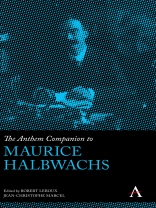This book seeks to place Halbwachs in his historical and intellectual context, showing that his work was sensitive to the events of his time, and that the development of his analysis could be influenced by happenstance. The book does this, not by summarizing or synthesizing his thinking, by the growing literature embodied by many sociologists and historians of social sciences, published for the most part in scientific journals, that focus on the sociological thought that Halbwachs developed in his writings. Then come many studies that emerge from the history of ideas and epistemology: these are entirely devoted to a particular facet of Halbwachs’ work, either to place it in its scientific context or to discuss it on the basis of fundamental cognitive issues.
Inhoudsopgave
Introduction; Chapter 1. A Theorist of Collective Memory, Éric Brian; Chapter 2. Halbwachs and the Durkheimian Perspective on History, Robert Leroux; Chapter 3. Maurice Halbwachs, Sociologist of Memory: His Reception in Italy and the Development of the Sociology of Memory, Teresa Grande; Chapter 4. Population as the Body of Society, Jean-Christophe Marcel; Chapter 5. Urban Morphology and Social Morphology: Marcel Roncayolo and the Work of Maurice Halbwachs, Gilles Montigny; Chapter 6. Halbwachs’s Leibniz and Halbwachs’s Sociology, Guillaume Coqui; Chapter 7. Halbwachs on Quetelet and the Use of Statistics in Sociology, Christian Robitaille; Chapter 8. Maurice Halbwachs and the Sociology of Consumption and Social Classes, Lorenzo Migliorati; Chapter 9. From Criticism of Moral to the Probalistic Test, Éric Brian; Chapter 10. The Age Criterion: Between Sociology and Biology, Marie Jaisson; Chapter 11. Speculation: Order or Disorder?, Jacques Lautman; List of Contributors; Index.
Over de auteur
Robert Leroux is a professor of sociology at the University of Ottawa.
Jean-Christophe Marcel is a professor of sociology at the University of Burgundy.












